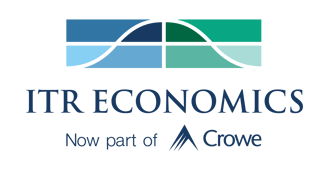During the Q&A portion of our presentations, I and other ITR speakers invariably find ourselves being tugged toward the political sphere. Folks sometimes seem disappointed when I answer politically tinged questions from an economist’s perspective rather than offer that fiery take one might expect from a political pundit. ITR is an apolitical organization, after all, and we are more “ITR-tisan” than partisan.
“What outcome do you expect from the midterm elections?” or along those lines, is a question that popped up recently, and one I expect will become more frequent heading into the fall. It’s a significant question, and one I am woefully unqualified to answer. So, I decided to analyze it through an economic, rather than political lens, to see if that might bear fruit.
The table below depicts midterm election outcomes back through 1954 and includes the president, his political party, the phase of the economy based on US Industrial Production, and the number of seats the president’s party gained or lost in the House and Senate.

To understand the State-of-the-Economy column, one must be familiar with our Phase Methodology, which includes four phases.
Phase B is the Accelerating Growth phase of the business cycle: the ”best” phase for the economy and, presumably, the one in which the electorate would be most satisfied with the economic climate and political leadership.
Phase C is the Slowing Growth phase, indicating the economy at large is decelerating.
Phase D is Recession, in which the economy is deteriorating – a disastrous time, one would assume, to be a politician up for reelection.
In Phase A, Recovery, the economy is behind where it was a year ago but moving in the right direction.
Some observations:
- From 1954 through 1982, there seemed to be some semblance of a positive relationship between the economy and midterm outcomes.
- In 1962, the accelerating economy perhaps boosted Democrats, who lost just four House seats and picked up three precious Senate seats.
- In the remaining elections, a slowing economy or outright recession coincided with losses for the incumbent president’s party, disastrously so in 1958, 1966, and 1974.
- From the 1986 election onward, there seems to be no relationship at all between midterm elections and the state of the economy.
- In 1998, Bill Clinton presided over an economy that was technically slowing down, but Democrats maintained their Senate numbers and gained seats in the House. Then, in 2002, under George W. Bush, when the US economy was in recovery and technically behind where it was a year earlier, Republicans picked up seats in both the House and Senate.
- However, whenever a midterm election coincided with an accelerating US economy, the incumbent’s party apparently did not benefit and actually lost seats in both the House and Senate, including in 1994 and 2010, two of the three largest negative net swings.
This is high-level analysis, but it offers a take-away:
Although midterm elections never occur in an economic vacuum, the notion that the economy is the “key” to their outcome is not true. Stay tuned – in two years we will see if the idea holds more validity in presidential election years.
Connor Lokar
Economist


